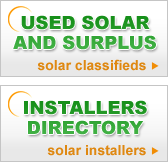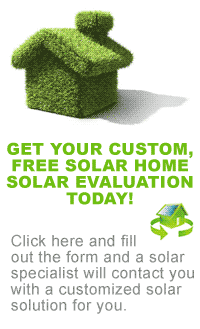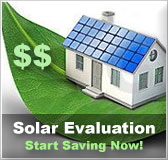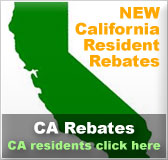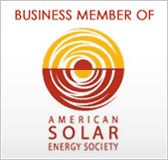Energy conservation device permitting fees – Riverhead:
-This financial incentive provides a discount on the building permit
fee to residents in Riverhead who plan to install photovoltaics on
the property.
-Before the code was revised permit fees for solar panels were often
up to $1,000, now the permit fee is $150 flat rate.
Photovoltaic (PV) rebate program – Town of Southampton:
-Residents of Southampton who install photovoltaic systems with 5
kilowatts AC or larger will receive a rebate of $2,500 through this
program.
-Applicants must submit all required certificates and invoices to
qualify and systems must comply with all laws and meet all standards.
-Smaller systems are not eligible for a rebate.
Solar and fuel cell tax credit:
-New York residents are offered a personal income tax credit equal
to 25% of the equipment and installation cost of solar electric systems
up to $5,000 if the system was purchased and installed on or after
September 1, 2006. All systems purchased and installed before that
date have a maximum incentive of $3,750.
-Fuel cells are also eligible for a personal income tax credit of
20% of the total cost with a maximum incentive of $1,500.
-Residential solar-electric systems are limited to a maximum capacity
of 10 kilowatts and fuel cells have a maximum of 25 kilowatts to be
eligible.
Property tax abatement for photovoltaic (PV) equipment expenditures:
-Residents of New York City are allowed a property tax abatement
for photovoltaic system expenditures made on their property.
-PV systems installed between August 5, 2008 and December 31, 2010
will receive an abatement of 8.75% of expenditures per year for four
years. Systems installed between January 1, 2011 and December 31,
2012 will receive 5%.
Energy conservation improvements property tax exemption:
-New York residents who make energy conservation improvements to
their homes are able to tax exempt the improvements from their property
taxes.
-The amount of the tax exemption is equal to the amount of the value
added to the home due to the improvements.
-Solar and wind energy systems are included in this exemption.
Solar, wind and biomass energy systems exemption – local
option:
-The state of New York allows a 15 year real property tax exemption
on all solar and wind energy systems. Biomass is also eligible for
this tax exemption.
-The amount of the exemption is equal to the total increased value
of the property due to the wind, solar or farm waste energy system.
Solar sales tax exemption:
-In New York, solar energy systems are 100% exempt from state sales
and compensating use taxes.
-Eligible solar energy systems utilize solar radiation to produce
energy designed to provide electricity, hot water, heating or cooling
such as photovoltaics, solar space heating and solar water heating
systems.
Energy Smart Loan Fund – NYSERDA:
-Participating lenders of the New York Energy Smart Loan Fund provide
low interest rate loans to residents who wish to make energy efficiency
improvements and renovations or add renewable energy systems to their
home.
-Interest rates at generally 4% lower than the lender rate and remains
at that rate for up to ten years.
-Maximum loan amounts are set at $20,000 for a 1-4 family home.
Home performance with energy star loan program – NYSERDA:
-The New York Energy Smart Loan Fund offers an unsecured loan of
up to $20,000 to residents who wish to install qualified energy efficient
and renewable energy equipment and technologies in their homes.
-To be eligible for this loan a certified contractor of the Building
Performance Institute must perform a Comprehensive Home Assessment.
The borrower will then work with the contractor to decide which improvements
will be made.
-All mandatory forms and certificates must be sent to the program
administrator in order to receive this loan.
-Participants must be customers of a specified utility to qualify.
PV incentive program – NYSERDA:
-Residents of New York who install qualifying grid connected photovoltaic
systems are eligible to receive an incentive of $2.00 - $5.00 per
watt DC.
-Maximum capacity for residential systems is 8 kilowatts.
-Maximum incentive amount is $28,000 for residents.
Solar thermal rebate program – National Grid:
-Through this program, National Grid offers funding for residential
customers who install solar thermal technologies.
-This rebate pays 15% of the total of a residential system.
- Maximum incentive amount is $1,500.
-In order for participants to receive a rebate, they must share their
water heating usage data for 12 consecutive months.
Solar rebate program – Long Island Power Authority:
-The LIPA solar rebate program offers rebates to residential customers
who purchase and install solar PV systems.
-Rebate amounts are approximately 50% of the system cost.
-Eligible residential PV systems have a capacity limit of 27.5 kilowatts.
-Rebates are only provided for the first 10 kilowatts.
Net metering – Long Island Power Authority:
-Net metering is available to customers of LIPA who have solar, wind
or hybrid systems up to 27.5 kilowatt capacity.
-Systems must have a single-bidirectional meter which calculates the
flow of electricity in both directions.
-Net excess generation (NEG) is carried forward from month to month
at the customer's retail electricity rate and shows up as a credit
on the customer’s monthly bill.
Net metering – New York:
-The state of New York offers the option of net metering to it’s
residential customers who own grid connected solar or wind energy
systems.
-The power produced by the renewable energy system is used to offset
the kilowatt hours consumed each month. The incentive shows up as
a credit on the customer’s monthly bill.
-Customers keep all renewable energy credits connected to the electricity
their system generates.
-Systems must have a capacity of 25 kilowatts or less to be eligible
for net metering.
Residential renewable energy tax credit:
-This personal tax credit allows the taxpayer to claim a credit of
30% of expenditures including labor costs and installation of qualified
residential solar-electric systems, solar water heating systems or
fuel cells. Small wind-energy systems and geothermal heat pumps can
also be accredited for.
-Solar-electric systems and solar water heaters have a maximum incentive
of $2,000 if placed in service before 2009. There is no maximum incentive
for systems placed after 2008.
-The excess amount of the federal tax credit may be carried forward
to the next taxable year if it exceeds tax liability.
-This can be carried forward until 2016, but after that, it is unknown
if the unused credit will be able to be forwarded.
Residential energy conservation subsidy exclusion:
-This is a personal exemption of 100% of energy conservation subsidies
provided by public utilities.
-The value of a purchase or installation of any energy conservation
measure by a customer such as solar water heat, solar space heat or
photovoltaics will not be included in the customer’s gross income.
-Customers of an electric utility company, who participate in the
utility’s energy conservation program, may receive a rate reduction
of electricity furnished or a nonrefundable credit against the purchase
price of the electricity on each monthly electric bill.
Energy-efficient mortgages:
-This is a federal loan program where homeowners can use EEM (energy-efficient
mortgages) to finance renewable energy technologies in a home.

